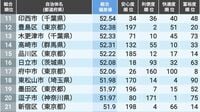インドIT産業はまだ伸びる、この時期こそチャンス--スブラマニアン・ラマドライ タタ・コンサルタンシー・サービシズ(TCS)CEO兼社長 Now is the time of opportunity. Indian IT will continue to grow. --Mr. Subramanian Ramadorai, Tata Consultancy Services (TCS) CEO & MD
※これはインタビューの英訳です
IT, a major driving behind the Indian economy, has recently been confronted with an unavoidable deceleration in light of the global financial crisis. India’s largest IT firm Tata Consultancy Services (TCS), with clientele in the U.S., Europe and over 140 countries worldwide, is no exception to the rule. The company recorded a 33% year on year increase in profits for the financial year to March 31, 2008, but the most recent quarter (Oct~Dec) has seen revenues plateau on a year to year basis. This trend is bound to continue.
We spoke to Mr. Ramadorai, TCS’ CEO since 1996, about how the company plans to overcome the current situation.
“The global financial crisis is taking a significant toll on the Indian IT industry. (How do you view this?)”
IT is one of the few industries that continue to grow. However, in light of current economic conditions and confusion in the market, a decline in demand cannot be helped. In regards to the quarter for Oct~Dec 2008, drastic fluctuations in foreign exchange rates played a big part. When you look at things on an operating profit base, we are in good shape. Cash flows are also healthy.
It is a fact though that we have seen a reduction in procurement from specific sectors. Financial and automotive sectors have been particularly severe. These two industries are themselves amidst difficult times. Additionally there is the telecommunications industry as is illustrated by the collapse of leading Canadian firm, Nortel Networks. There is a great deal of change occurring globally and nobody can quite say when or how things will recover. It goes without saying that Japan too is faced with challenging times. It isn’t so bad that we are having trouble collecting receivables, but we are certainly seeing a decline in demand from customers in the financial and automotive sectors.
“In light of the current challenges facing you, what measures are you taking to combat them?”
I believe it is essential to raise operating efficiency. As such we are assessing all operations to ascertain whether there is any waste that can be eliminated. Travel expense waste, communications costs waste, maintenance cost waste, there is a myriad of waste to be addressed. We are replacing in person business trips with video conferencing, and where the need for business travel remains we are negotiating more intensely than before for reduced airfares. We are also reassessing the necessity and urgency of equipment investment, postponing initiatives where appropriate. Management of receivables is being carried out more stringently, too. We have quarterly checks in place to ensure that receivables are collected according to contract.
Furthermore, it is in times like this that talent utilization is of great importance. We are looking at whether we have the right people in the right place, and whether each employee is equipped with the right set of skills. When we talk about necessary skills we don’t merely mean those that are needed to the work we do today, but also the skills one will need tomorrow for proactive business development in a new industry or region.
“Up until now you have focused growth strategies on Europe and the U.S., but in light of recent difficulties in these markets do you see the need to enhance your efforts in developing markets?”
You’re absolutely right. We are looking at markets that show promise of growing, markets the likes of South America, India, China, Thailand and Australia. Of course, this is not to say that we will forget about mature markets all of a sudden. We have some of our longest and most important customers in western markets. Currently our revenue structure is 50% U.S. based, 24~25% Europe (incl. U.K.), 11% India, with the remainder coming from South America, APAC, the Middle East and Africa. While these figures are not likely to change drastically overnight, we do foresee the Indian and APAC markets increasing a few percent.






























